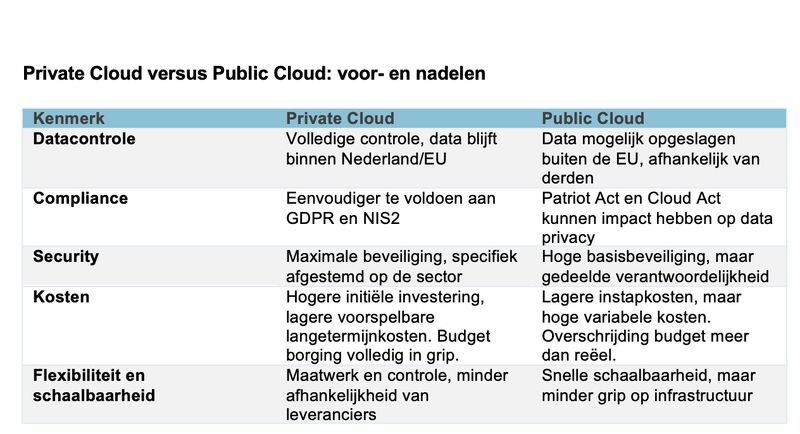Digital sovereignty and data security have become top priorities for public sector bodies and healthcare organisations in the Netherlands. While Public Cloud services such as Azure, AWS, and Google Cloud offer clear benefits, the need for a secure, compliant infrastructure that ensures complete control over data is growing rapidly. So, what are the pros and cons of a Private Cloud strategy compared to a Public Cloud approach? And why should Dutch healthcare and public organisations act now to secure a sovereign Cloud solution?
Private Cloud: the key to digital sovereignty for the public sector and healthcare
At a time when digital security and legislation are becoming ever more complex, public sector and healthcare organisations in the Netherlands face a crucial question: how can you manage data in a way that is both secure and compliant? Public Cloud platforms such as AWS, Azure, and Google Cloud offer scalability and convenience — but they also raise concerns around control, compliance, and dependence on non-European providers. That’s why more and more organisations are turning to Private Cloud solutions: infrastructures that not only meet strict European regulations but also deliver full data control and enhanced digital resilience. In this article, we explore the advantages and challenges of a Private Cloud strategy — and why now is the time to invest in digital sovereignty.
What are the challenges?
Compliance: Regulations such as GDPR and NIS2 impose strict requirements on data management and storage. Many Public Cloud providers fall under U.S. jurisdiction (such as the Patriot Act), which introduces potential risks.
Data control: Data stored in Public Clouds can reside outside the EU, creating dependencies on foreign legislation and technologies.
Security: Public sector and healthcare organisations are increasingly targeted by cyberattacks, requiring greater control over infrastructure and data protection.
Short- and long-term implications of a Private Cloud strategy
Short term
✅ Direct control over data and infrastructure
✅ Fast compliance with regulations such as GDPR and NIS2
✅ Reduced risk of data breaches and compliance fines
✅ 24/7 advice and support from local Cloud Service Providers
❌ Potentially higher initial investment costs compared to hyperscalers for low-performance infrastructure
Long term
✅ Lower operational costs through predictable pricing
✅ Less dependency on U.S. tech giants
✅ Improved cybersecurity and digital resilience
✅ Local Cloud Service Providers become strategic knowledge partners
❌ Potentially limited scalability compared to hyperscalers for low-performance infrastructure
Why public sector and healthcare organisations should (re)consider their Cloud strategy — and act now
With the growing threat of cyberattacks and increasingly strict European regulations, maintaining control over data is no longer optional — it’s essential.
By choosing a local, Dutch Private (sovereign) Cloud solution, public sector bodies and healthcare organisations benefit from maximum security, full compliance, and predictable cost structures.
Are you ready for a secure, compliant, and future-proof Dutch Cloud strategy?
Get in touch and discover how Fundaments — the Dutch expert in Private Clouds — can offer proven solutions tailored to your organisation.

